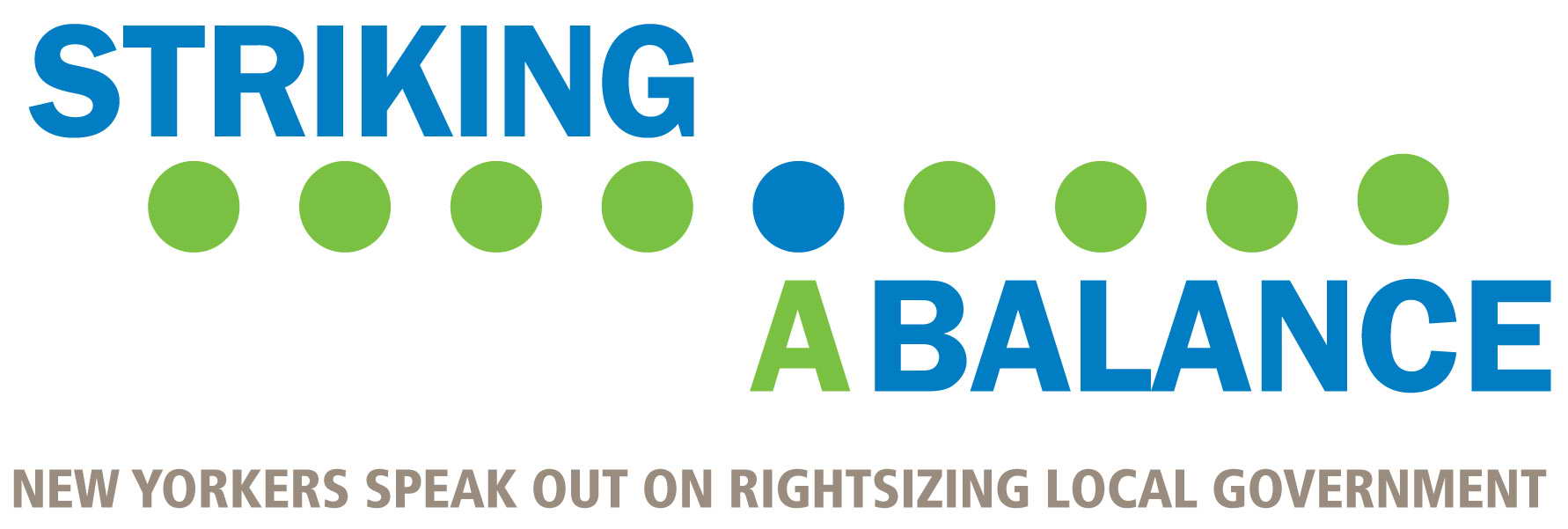April 12, 2011
4/12: “Striking a Balance”
Local governments in New York State are at a crossroads. Faced with high taxes, rising costs, and already strained state and federal budgets, how can local governments still provide essential services? Is rightsizing local government the answer?
Click Here for Full Press Information
The question of restructuring local government is at the heart of “Striking a Balance: New Yorkers Speak Out on Rightsizing Local Government.” This major study of more than 4,500 New Yorkers, funded by the Dyson Foundation and conducted by the Marist College Institute for Public Opinion, takes an in-depth look at the issue of local government consolidation on a statewide level and in nine regions — the Capital Region, the Adirondacks, Western New York, the Finger Lakes, Central New York, the Mid-Hudson Valley, the Lower Hudson Valley, New York City, and Long Island.
“We believe this is an extremely important time to release these results of the Marist Poll’s survey of more than 4,500 New Yorkers,” says Robert R. Dyson, President of the Dyson Foundation. “We anticipate this survey will serve government and public policy makers in their deliberations on this important and somewhat volatile subject. It is our hope to provide a balanced and comprehensive public perspective to inform and aid in the coming debates.”
Survey Findings:
The State of New York
- 53% of New Yorkers think the state is moving in the wrong direction.
- While statewide residents divide, 54% of those outside of New York City think there are too many local governments.
- 85% of New Yorkers give their local government average or above average grades. 60% have confidence in their local decision-makers, and 55% believe they get a good value for the taxes they pay.
Restructure Government? First Impressions
- 68% of New Yorkers have a positive impression of the term shared services. 60% have a similar reaction to government consolidation, and 58% say the same about merged services. 52% of New Yorkers have a positive impression of regionalism. However, dissolving local government is perceived positively by 31%.
- There is no consensus about the definition of consolidation. Half of residents describe consolidation as shared services while 44% define it as merged government.
- Pluralities of New Yorkers expect government consolidation to decrease costs (48%) and increase efficiency (45%).
Government Consolidation: Where New Yorkers Stand
- 54% of New Yorkers outside of New York City, which is mostly consolidated, favor local government consolidation for their local government.
- Only 13% of New Yorkers think that no towns or cities in New York should be considered for consolidation. 40%, however, believe all towns or cities should be considered for consolidation while 47% say the action should be considered for towns and cities under certain circumstances.
“These are difficult economic times. If consolidation reduces cost, improves government efficiency, and supports economic growth without sacrificing local identity, then, New Yorkers want consolidation considered,” says Lee M. Miringoff, Director of the Marist College Institute for Public Opinion. “If not, it’s back to the drawing board for restructuring local government.”
Government Consolidation: Getting Specific
- Outside of New York City, New Yorkers were asked about the consolidation of specific services. The services New Yorkers favor for consolidation are public transportation (73%), road and highway maintenance (68%), parks and recreation (66%), prisons (57%), and public libraries (56%). They are on the fence about the consolidation of police (51%) and fire and rescue services (48%).
- Only 45% of New Yorkers support the consolidation of school districts.
- While notable proportions of New Yorkers rely on private services to carry out these functions, New Yorkers view the consolidation of recycling services (69%), garbage removal (56%), sewage services (55%), and drinking water (53%) positively.
Government Consolidation: A Balancing Act
- Again, New Yorkers outside of New York City were asked about potential risks and opportunities of consolidation. New Yorkers are more likely to support consolidation if the quality of their local services increases (83%), their local community becomes more attractive to business (76%), their property taxes are cut (74%), or the cost of their local services decreases (68%). New Yorkers are also more likely to favor consolidation if greater efficiency is a result of consolidation (64%), duplication of services is reduced (64%), or their community receives grant money (61%).
- New Yorkers are more likely to oppose consolidation if they have less of a say in their local government (62%), costs for their community increases (62%), their community loses its sense of identity (56%), or consolidation leads to job losses (50%). If their local government is left out of the decision-making process (43%), or if there are no cost savings for them (43%), New Yorkers view consolidation less favorably.
Living with Consolidation: New York City Residents Rate Their Services
- In New York City, which is mostly consolidated, residents rate many of their services positively. The exceptions are public schools (42%) and road and highway maintenance (27%).
Key regional findings and complete survey results for “Striking a Balance: New Yorkers Speak Out on Rightsizing Local Government” may be found at www.nylocalgov.org. For more information about the Marist Poll, visit www.maristpoll.wpengine.com. To learn more about the Dyson Foundation, log on to www.dysonfoundation.org.
More About the Study:


